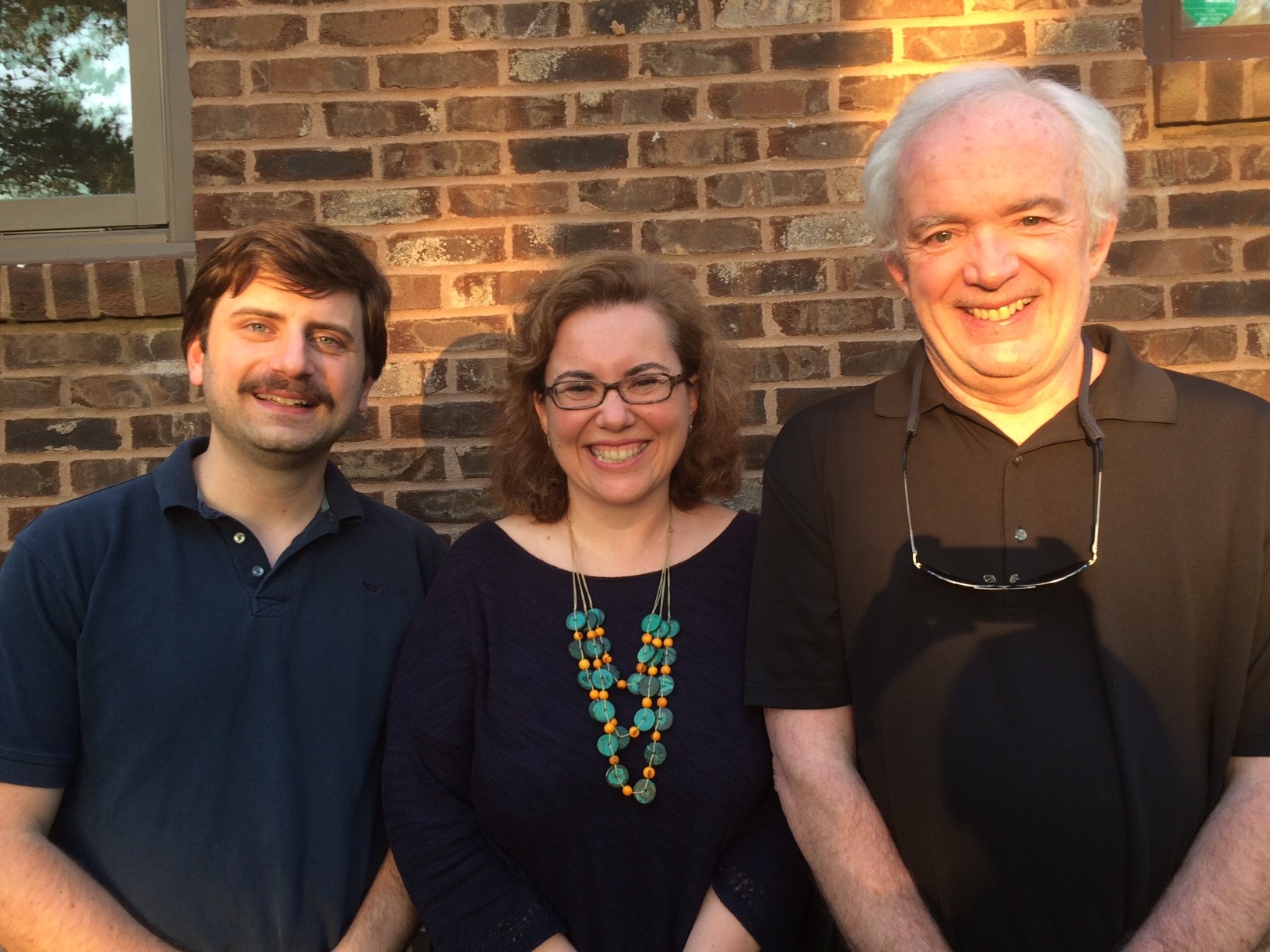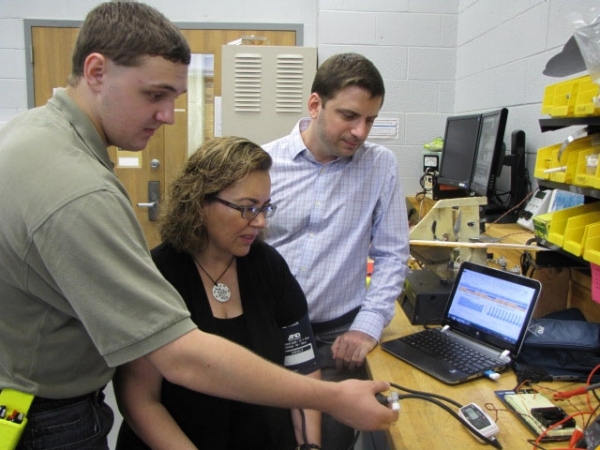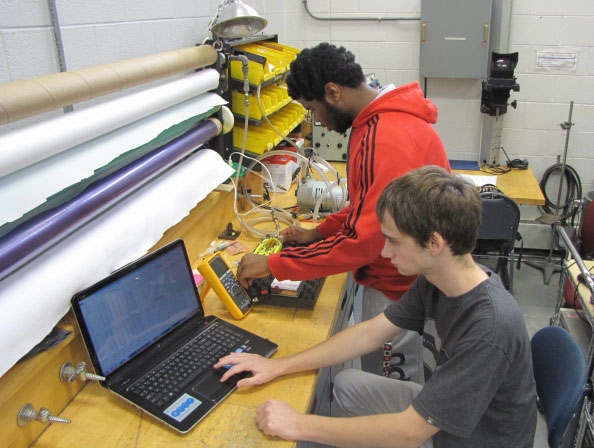ODU Collaborates with Cardiologist to Develop Cutting-edge Blood Pressure Cuff
August 06, 2015
 (L to R) Through a unique collaboration, Onur Bilgen, Dr. Muge Akpinar-Elci and Dr. John Kenerson devised a way to create a blood pressure cuff that generates its own electricity.
(L to R) Through a unique collaboration, Onur Bilgen, Dr. Muge Akpinar-Elci and Dr. John Kenerson devised a way to create a blood pressure cuff that generates its own electricity.
 Joshua Harden, from the Math and Science Academy at Ocean Lakes High School, shares blood pressure data with Dr. Muge Akpinar-Elci, director of the Center for Global Health, and Onur Bilgen, an assistant professor in ODU’s Mechanical and Aerospace Department.
Joshua Harden, from the Math and Science Academy at Ocean Lakes High School, shares blood pressure data with Dr. Muge Akpinar-Elci, director of the Center for Global Health, and Onur Bilgen, an assistant professor in ODU’s Mechanical and Aerospace Department.
 Bryce Horne, foreground, and Tony Crawford, incoming freshmen engineering students at ODU, spent part of the summer helping develop a revolutionary blood pressure cuff.
Bryce Horne, foreground, and Tony Crawford, incoming freshmen engineering students at ODU, spent part of the summer helping develop a revolutionary blood pressure cuff.
High blood pressure, or hypertension, is called the silent killer because it often strikes without warning, leading to heart disease and stroke. One in three adults in the United States (about 70 million people) have high blood pressure, and according to the Centers for Disease Control and Prevention, only about half have the condition under control.
Hypertension is credited for an estimated 7.5 million deaths worldwide. The World Health Organization says the medical condition is the second leading cause of maternal mortality worldwide, responsible for 12.8 percent of the total deaths. Diagnosis, prognosis and management are critical with hypertension, which can result in coronary heart disease and stroke.
When Old Dominion's Dr. Muge Akpinar-Elci and Onur Bilgen, of the College of Health Sciences and the Frank Batten College of Engineering and Technology, respectively, first crossed paths with Virginia Beach cardiologist Dr. John Kenerson they didn't realize just how much they had in common and - more importantly - how collaboration could have a positive impact on global hypertension.
Akpinar-Elci, the director of the Old Dominion University's Center for Global Health, came to the College of Health Sciences to launch an innovative initiative that encourages interdisciplinary approaches to addressing global health issues at home and abroad.
Bilgen, who has a Ph.D. in mechanical engineering, joined the Mechanical and Aerospace Department at ODU three years ago as an assistant professor. His research focuses on structures, dynamics, fluid mechanics and aerodynamics.
In addition to his work as a cardiologist, Kenerson is also co-founder of Colleagues in Care - a nonprofit organization dedicated to alleviating suffering and building capacities to improve health care services in regions challenged by poverty, resources and complex systemic issues.
Together, the three set out on a mission: Find a way to diagnose hypertension in areas where resources and electricity are scarce.
Shelley Mishoe, dean of the College of Health Sciences, formed the Center for Global Health to facilitate such collaborations to help solve persistent global health problems. "I am so pleased to see this work progress after making the introductions between Drs. Akpinar-Elci and Kenerson so they could discuss potential collaborations with the center and Colleagues in Care."
Kenerson helped form Colleagues in Care in 2010, the year a devastating earthquake hit Haiti, and his nonprofit has been helping Haitians rebuild as well as battle hypertension, the greatest cause of morbidity and mortality among adults there - ahead of HIV, cholera, tuberculosis and malaria combined.
In pursuit of a reliable, less expensive, more accessible, durable and smaller blood pressure device, Bilgen - in collaboration with Kenerson and Akpinar-Elci - is developing a blood pressure cuff that operates on harvested energy generated by the mechanism itself.
"Concerning global health, I know the problems that need attention worldwide, but in many cases I don't know what kind of technology is available," Akpinar-Elci said. "Onur helped me explore such possibilities."
Automatic equipment, which uses electricity to gauge blood pressure, has the advantage of having one unit so less manual dexterity is needed compared to system that uses a separate gauge and stethoscope. Besides being easier to use, it minimizes human error and works well for those with hearing or vision loss.
"Fully mechanical (old-fashioned) blood pressure monitoring devices, and modern semi-automatic or fully automatic devices that use electricity to determine pressure have differences in terms of accuracy of measurement, practicality to the doctor, caregiver or patient, and product lifetime," Bilgen said. "A direct comparison is difficult, and advantages/disadvantages depends on the context; however, one can say that electrical semi-automatic and automatic devices are more practical for patients or for non-expert care-givers in home-use applications where resources such as batteries, power source, or replacement devices are readily available."
Using limited resources, Bilgen and his small crew of lab assistants - incoming ODU engineering freshmen Bryce Horne and Tony Crawford, and Ocena Lakes High School senior Joshua Harden - have been working to determine precisely the amount of energy necessary to power the cuff. Now that they have been able to harness more than enough electricity to power their device, the group is on the verge of marrying the energy-generating mechanism with the blood pressure device. Once that step is complete, the team will focus on getting additional funding to build a prototype. Their paper on the device was recently published in the Journal of Clinical Hypertension.
"The device uses piezoelectricity, which relies on changes in pressure (in this case accelerated air produced in the inflating of a blood pressure cuff) to generate electrical energy," Bilgen said. "Piezoelectricity is found in such items as recording devices, speakers and microphones."
These technologies highlight the importance of catalytic innovation, Kenerson says, which offers simpler solutions aimed at underserved groups.
One of the clear advantages of such a device in developing countries, where 80 percent of hypertension-related diseases occur, is it doesn't rely on electricity, which can be a scarcity. An added bonus of the device Bilgen is developing is it eliminates the need for disposable batteries that end up in landfills.
Kenerson is a huge proponent of collaboration as a means to solve health care issues at home and abroad. One of the maxims of Colleagues in Care is "Knowledge is power. Shared knowledge is transformational." He believes this device will be a product of those words.
Describing the ODU collaboration, he succinctly puts it: "When you think about something that can be done, you need to ask yourself: 'Why not here; why not now?'"

